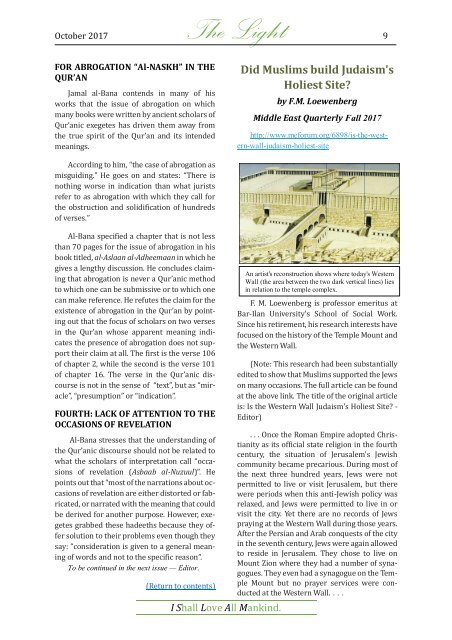The Light English edition October 2017
Organ of the Ahmadiyya Anjuman Ishaat Islam of Lahore popularly known as The Lahore Ahmadiyya Movement. The only organisation which believes in the finality of prophethood. Preaching Islam as in the Holy Quran and as taught by the Holy Prophet Muhammad (s) - rational, peaceful, scientific, inclusive.
Organ of the Ahmadiyya Anjuman Ishaat Islam of Lahore popularly known as The Lahore Ahmadiyya Movement. The only organisation which believes in the finality of prophethood. Preaching Islam as in the Holy Quran and as taught by the Holy Prophet Muhammad (s) - rational, peaceful, scientific, inclusive.
Create successful ePaper yourself
Turn your PDF publications into a flip-book with our unique Google optimized e-Paper software.
<strong>October</strong> <strong>2017</strong> <strong>The</strong><br />
<strong>Light</strong> 9<br />
FOR ABROGATION “Al-NASKH” IN THE<br />
QUR’AN<br />
Jamal al-Bana contends in many of his<br />
works that the issue of abrogation on which<br />
many books were written by ancient scholars of<br />
Qur’anic exegetes has driven them away from<br />
the true spirit of the Qur’an and its intended<br />
meanings.<br />
Did Muslims build Judaism's<br />
Holiest Site?<br />
by F.M. Loewenberg<br />
Middle East Quarterly Fall <strong>2017</strong><br />
http://www.meforum.org/6898/is-the-western-wall-judaism-holiest-site<br />
According to him, “the case of abrogation as<br />
misguiding.” He goes on and states: “<strong>The</strong>re is<br />
nothing worse in indication than what jurists<br />
refer to as abrogation with which they call for<br />
the obstruction and solidification of hundreds<br />
of verses.”<br />
Al-Bana specified a chapter that is not less<br />
than 70 pages for the issue of abrogation in his<br />
book titled, al-Aslaan al-Adheemaan in which he<br />
gives a lengthy discussion. He concludes claiming<br />
that abrogation is never a Qur’anic method<br />
to which one can be submissive or to which one<br />
can make reference. He refutes the claim for the<br />
existence of abrogation in the Qur’an by pointing<br />
out that the focus of scholars on two verses<br />
in the Qur’an whose apparent meaning indicates<br />
the presence of abrogation does not support<br />
their claim at all. <strong>The</strong> first is the verse 106<br />
of chapter 2, while the second is the verse 101<br />
of chapter 16. <strong>The</strong> verse in the Qur’anic discourse<br />
is not in the sense of “text”, but as “miracle”,<br />
“presumption” or “indication”.<br />
FOURTH: LACK OF ATTENTION TO THE<br />
OCCASIONS OF REVELATION<br />
Al-Bana stresses that the understanding of<br />
the Qur’anic discourse should not be related to<br />
what the scholars of interpretation call “occasions<br />
of revelation (Asbaab al-Nuzuul)”. He<br />
points out that “most of the narrations about occasions<br />
of revelation are either distorted or fabricated,<br />
or narrated with the meaning that could<br />
be derived for another purpose. However, exegetes<br />
grabbed these hadeeths because they offer<br />
solution to their problems even though they<br />
say: “consideration is given to a general meaning<br />
of words and not to the specific reason”.<br />
To be continued in the next issue — Editor.<br />
(Return to contents)<br />
I Shall Love All Mankind.<br />
An artist's reconstruction shows where today's Western<br />
Wall (the area between the two dark vertical lines) lies<br />
in relation to the temple complex.<br />
F. M. Loewenberg is professor emeritus at<br />
Bar-Ilan University's School of Social Work.<br />
Since his retirement, his research interests have<br />
focused on the history of the Temple Mount and<br />
the Western Wall.<br />
(Note: This research had been substantially<br />
edited to show that Muslims supported the Jews<br />
on many occasions. <strong>The</strong> full article can be found<br />
at the above link. <strong>The</strong> title of the original article<br />
is: Is the Western Wall Judaism’s Holiest Site? -<br />
Editor)<br />
. . . Once the Roman Empire adopted Christianity<br />
as its official state religion in the fourth<br />
century, the situation of Jerusalem's Jewish<br />
community became precarious. During most of<br />
the next three hundred years, Jews were not<br />
permitted to live or visit Jerusalem, but there<br />
were periods when this anti-Jewish policy was<br />
relaxed, and Jews were permitted to live in or<br />
visit the city. Yet there are no records of Jews<br />
praying at the Western Wall during those years.<br />
After the Persian and Arab conquests of the city<br />
in the seventh century, Jews were again allowed<br />
to reside in Jerusalem. <strong>The</strong>y chose to live on<br />
Mount Zion where they had a number of synagogues.<br />
<strong>The</strong>y even had a synagogue on the Temple<br />
Mount but no prayer services were conducted<br />
at the Western Wall. . . .














